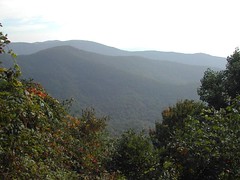Vegetarian yet?
The question of meat-eating seems to be getting lots of attention lately. Note a long post with lots of links on Boing Boing, from Xeni Jardin, prompted by an expose in Rolling Stone on Smithfield's hog farming operations: Boss Hog. Some of the scary statistics:
Worry about North Carolina's hog farms is not new news, since the Raleigh News & Observer did an Pulitzer-winning expose on the hog waste lagoons several years ago, and regulations were tightened. But a simple Google search still finds a lot of concern about environmental impacts.
Others, like this Metafilter post. and Vegetarian is the new Prius at Huffington Post, are linking to this worldwide report, Livestock's Long Shadow, a downloadable PDF from the UN's Livestock Environment and Development Virtual Centre. Conclusion:
When I was young, everyone was reading Frances Moore Lappe's Diet for a Small Planet. Many of us tried to live with less meat and more soy or other proteins in our diets. It seemed to be a reasonable way to help save the environment, among other benefits.
I eat more meat now, although I don't consider it a major part of my diet, and I'm perfectly happy without it. When I do buy meat I try to find a local or natural producer, and am usually sorry when I buy meat from the supermarket. I may never buy Smithfield products again.....
It seems Lappe's lessons still have a lot of relevance today. Her Small Planet Institute seems to be continuing the education, and Lappe's latest books cover a wider range of ideas as well.
Hogs produce three times more excrement than human beings do. The 500,000 pigs at a single Smithfield subsidiary in Utah generate more fecal matter each year than the 1.5 million inhabitants of Manhattan. The best estimates put Smithfield's total waste discharge at 26 million tons a year. That would fill four Yankee Stadiums.
...A lot of pig shit is one thing; a lot of highly toxic pig shit is another. The excrement of Smithfield hogs is hardly even pig shit: On a continuum of pollutants, it is probably closer to radioactive waste than to organic manure.
Worry about North Carolina's hog farms is not new news, since the Raleigh News & Observer did an Pulitzer-winning expose on the hog waste lagoons several years ago, and regulations were tightened. But a simple Google search still finds a lot of concern about environmental impacts.
Others, like this Metafilter post. and Vegetarian is the new Prius at Huffington Post, are linking to this worldwide report, Livestock's Long Shadow, a downloadable PDF from the UN's Livestock Environment and Development Virtual Centre. Conclusion:
Livestock’s contribution to environmental problems is on a massive scale and its potential contribution to their solution is equally large. The impact is so significant that it needs to be addressed with urgency. Major reductions in impact could be achieved at reasonable cost.
When I was young, everyone was reading Frances Moore Lappe's Diet for a Small Planet. Many of us tried to live with less meat and more soy or other proteins in our diets. It seemed to be a reasonable way to help save the environment, among other benefits.
I eat more meat now, although I don't consider it a major part of my diet, and I'm perfectly happy without it. When I do buy meat I try to find a local or natural producer, and am usually sorry when I buy meat from the supermarket. I may never buy Smithfield products again.....
It seems Lappe's lessons still have a lot of relevance today. Her Small Planet Institute seems to be continuing the education, and Lappe's latest books cover a wider range of ideas as well.
Labels: environment





0 Comments:
Post a Comment
<< Home